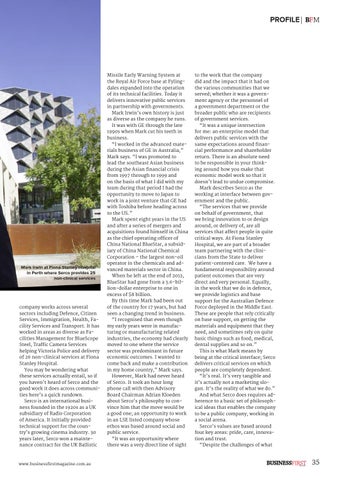PROFILE| BFM
Mark Irwin at Fiona Stanley Hospital in Perth where Serco provides 25 non-clinical services
company works across several sectors including Defence, Citizen Services, Immigration, Health, Facility Services and Transport. It has worked in areas as diverse as Facilities Management for BlueScope Steel, Traffic Camera Services helping Victoria Police and delivery of 26 non-clinical services at Fiona Stanley Hospital. You may be wondering what these services actually entail, so if you haven’t heard of Serco and the good work it does across communities here’s a quick rundown. Serco is an international business founded in the 1920s as a UK subsidiary of Radio Corporation of America. It initially provided technical support for the country’s growing cinema industry. 30 years later, Serco won a maintenance contract for the UK Ballistic
www.businessfirstmagazine.com.au
Missile Early Warning System at the Royal Air Force base at Fylingdales expanded into the operation of its technical facilities. Today it delivers innovative public services in partnership with governments. Mark Irwin’s own history is just as diverse as the company he runs. It was with GE through the late 1990s when Mark cut his teeth in business. “I worked in the advanced materials business of GE in Australia,” Mark says. “I was promoted to lead the southeast Asian business during the Asian financial crisis from 1997 through to 1999 and on the basis of what I did with my team during that period I had the opportunity to move to Japan to work in a joint venture that GE had with Toshiba before heading across to the US.” Mark spent eight years in the US and after a series of mergers and acquisitions found himself in China as the chief operating officer of China National BlueStar, a subsidiary of China National Chemical Corporation – the largest non-oil operator in the chemicals and advanced materials sector in China. When he left at the end of 2012, BlueStar had gone from a 3.6-billion-dollar enterprise to one in excess of $8 billion. By this time Mark had been out of the country for 17 years, but had seen a changing trend in business. “I recognised that even though my early years were in manufacturing or manufacturing related industries, the economy had clearly moved to one where the service sector was predominant in future economic outcomes. I wanted to come back and make a contribution in my home country,” Mark says. However, Mark had never heard of Serco. It took an hour long phone call with then Advisory Board Chairman Adrian Kloeden about Serco’s philosophy to convince him that the move would be a good one; an opportunity to work in an LSE listed company whose ethos was based around social and public service. “It was an opportunity where there was a very direct line of sight
to the work that the company did and the impact that it had on the various communities that we served; whether it was a government agency or the personnel of a government department or the broader public who are recipients of government services. “It was a unique intersection for me: an enterprise model that delivers public services with the same expectations around financial performance and shareholder return. There is an absolute need to be responsible in your thinking around how you make that economic model work so that it doesn’t lead to undue compromise. Mark describes Serco as the working at interface between government and the public. “The services that we provide on behalf of government, that we bring innovation to or design around, or delivery of, are all services that affect people in quite critical ways. At Fiona Stanley Hospital, we are part of a broader team partnering with the clinicians from the State to deliver patient-centered care. We have a fundamental responsibility around patient outcomes that are very direct and very personal. Equally, in the work that we do in defence, we provide logistics and base support for the Australian Defence Force deployed in the Middle East. These are people that rely critically on base support, on getting the materials and equipment that they need, and sometimes rely on quite basic things such as food, medical, dental supplies and so on.” This is what Mark means by being at the critical interface; Serco delivers critical services on which people are completely dependent. “It’s real. It’s very tangible and it’s actually not a marketing slogan. It’s the reality of what we do.” And what Serco does requires adherence to a basic set of philosophical ideas that enables the company to be a public company, working in a social arena. Serco’s values are based around four key areas: pride, care, innovation and trust. “Despite the challenges of what
BUSINESSFIRST MAGAZINE
35
